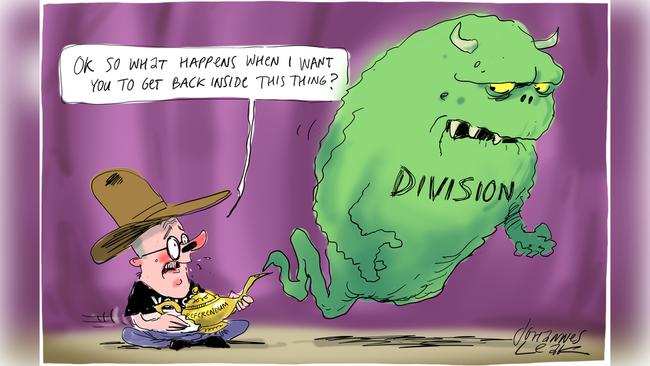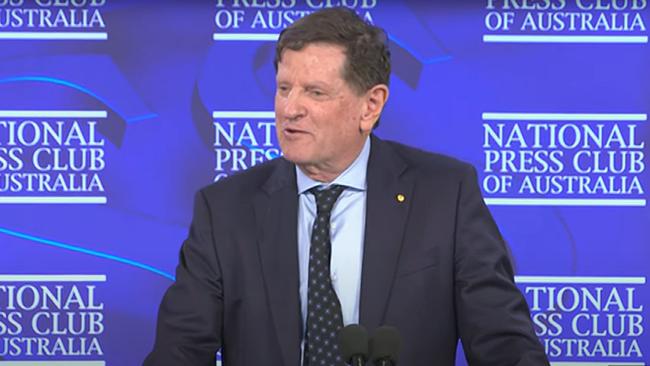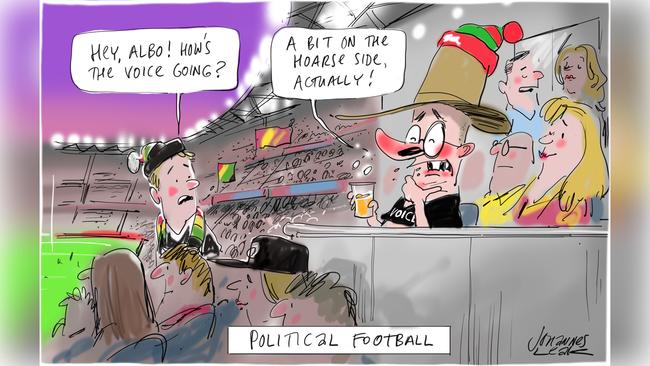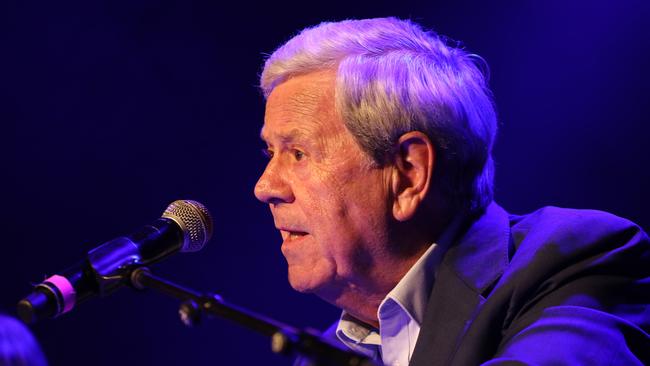‘If you don’t know, vote No … is a scream for real detail not a vibe’

“ ‘If you don’t know, vote no’ … that slogan was formed due to a lack of detail being provided. It was formed after inquiring minds were not given answers.
“The slogan is not inviting us to be uninquiring. It is screaming out to the government and voice architects, inviting them, in fact demanding they provide the real detail and not just a vibe and rhetoric. Or suffer a cautious No vote rather than secure a reckless Yes.”
Larry’s take:
“Mr French’s views are actually adding meat to ‘If you don’t know, vote No” because no one, including Mr French, knows whether parliament will legislate the limits on the voice he is talking about, how they will function or whether they will be upheld as valid by the High Court. Ray Martin says people should find out if they don’t know but all the inquiries in the world won’t produce answers when none exist, just more questions and uncertainties.”
Andrew added:
“Perhaps Mr French missed the Prime Minister stating it would be a brave government that ignores the voice’s advice. There’s also no analysis of how the voice will deliver practical benefits. Are we just to assume the voice’s advice will be the panacea for all ills but only if it is entrenched in the Constitution?”

Kerry was clear:
“The voice, if installed, would fatally undermine our democracy by permanently embedding unequal race-based representation in our constitution. Vote No.”
Zaphanera said:
“The voice is just more of the same elite-centric failing policy that is responsible for the gap, not the solution to solving it. We need a complete tear down of the system and a fresh start that listens to individual communities, not hand-picked political elites and ‘leaders’ that don’t represent all of the community.”
Steven suggested:
“We can have recognition without the voice, and French knows it.”
Jimothy had questions:
“You see this kind of argument in religious tracts, in political pamphlets, and in the works of Michel Foucault (although Foucault’s work is vastly more elaborate).
“They start with a quick bunch of romantic assumptions, of Baroque fancy, then quickly move on to some truisms and platitudes before you’ve had a chance to stop to challenge the opening assumptions. Pseudologic follows, expressed in such heartwarming terms that the essential circularity is forgotten in the emotional rush. But the form of the statements is exemplified by such assertions as ‘goodness is good, which is good to know, on account of the intrinsic goodness it entails’.”
Tallulah tut-tutted:
“I suppose this sort of analysis saves you grappling with the arguments themselves.”
Mark remarked:
“Constitutional recognition and the voice are about Australia’s first people. They are not about the race of those first people. The indigenous Sami people of Finland are recognised with a voice, they are blond and blue eyed.
“I don’t know why No campaigners keep obsessing about ‘racial’ differences between Australians of European ancestry and Aboriginal Australians. Australians of Indian ancestry are not getting a voice. Australians of Chinese ancestry are not getting a voice. This is because they are not Indigenous. The referendum is about being Indigenous, not about race.”
Chris countered:
“That is not a legal opinion. It is a political opinion where the answer is decided and then a bunch of noble savage rhetoric is deployed to support the straw man.”
Michael mooted:
“It’s incredible that the argument of a former chief justice of the High Court essentially comes down to the vibe.”

Tim’s trade-off:
“Surely we can then do away with the Senate and territory governments? Give me something at least that is not growing rent seeking bureaucrats and MPs. There must be some benefit to taxpayers.”
Ted M said:
“Mr French claims: ‘The text of the amendment makes clear that the act of recognition is based upon their historical status and not on the ill-defined concept of race.’ Really?
“The amendment is 95 words; 25 of which are 5 repetitions of ‘Aboriginal and Torres Strait Islander’, as in ATSI people. There is no mention of ‘their historical status’ beyond ‘First Peoples’. The amendment is squarely based in race; it is THE concept which identifies who the voice applies to.
“The concept of race is not ‘ill-defined’ for lawyers, as Mr French suggests.
1. It has been in our Constitution from the outset: s25 (voting rights), s51xxvi (original version specifically excluded ‘the Aboriginal race’ and the 1967 referendum question referred to ‘people of the Aboriginal Race’); s127 (excluding ‘Aboriginal natives’ from census, removed in 1967).
2. It is scattered through legislation such as Racial Discrimination Act (1975) in which ‘Aboriginal’ is expressly defined as ‘a person who is a descendant of an indigenous inhabitant’. It has played a key role in many HC decisions, including Mabo 1992 (established the ‘tripartite test’ to identify ‘Aboriginal People’) and through to Love 2020.
3. It appears in every significant international treaty on civil and political rights.
“When Mr French refers to ‘their historical status’ the key word is the determiner ‘their’, i.e., the ATSI race(s). The amendment makes no sense if the concept of race is stripped from it; it constitutionally demarcates who will benefit (3pc) and who will not (97pc).”
Scott said:
“The recent court decision against the Woodside Mining Company is the clearest indication yet of how the voice would operate should it get up.”
From Rob M:
“ ‘The voice creates a once-in-a-generation opportunity to fill a long silence in our Constitution. Heard and listened to, it provides a new national resource for closing the gap between Australia’s First Peoples and Australians as a whole.’ With the utmost respect to the chief justice, I have worked on the ground with Iindigenous camps for the last 25 years and seeing the horrors that go on, you have a tin ear to what the average Australian is thinking.”
Liam said:
“ ‘If you don’t know, vote No’ is just that, a slogan. But by virtue of the fact that many voters who are considering voting No are reading articles such as these shows that it’s not a knee-jerk reaction. We are trying to understand the Yes case.
“However, I have yet to read any argument – including this one – that explains how the voice will improve outcomes for indigenous Australians AND why those outcomes can’t be improved without the voice.
“I am a believer in the law of unintended consequences and nobody can know for sure how the voice will play out until it happens.
“I’d vote Yes in a heartbeat to recognition in the Constitution. I’d support a legislated voice and a change to the Constitution once it’s been shown to be successful.
“Prove the concept by legislating it. Show that it WILL close the gap and we will all support it.”
-

Veteran journalist Ray Martin stood by his scathing comments attacking the No campaign after he accused its key slogan of being “nonsensical” and likened it to being a “dinosaur or a d***head who can’t be bothered reading” the referendum proposal, wrote Sophie Elsworth. My Opinion’s opinion:
“Martin’s arrogance will surely do more for the No vote than it ever will for the Yes vote.“
Stephen agreed:
“It is astounding how often these supposed supporters of the voice are doing their best to convince more and more people to vote No.”
David’s deconstruction:
“So Martin won’t retract, says he’d say it again but then says he didn’t say it! Classic gaslighting.”
Jason’s Wife reckoned:
“The perfect excuse to order a dinosaur costume! Perhaps it will arrive by October 14th and I can wear it to the polls.”
Comeonnow’s comment:
“No one knows the consequence of the Voice if it gets up – not the PM, not High Court judges, not even the ‘trusted’ Ray Martin and that’s because the referendum deliberately was set up on ‘feelings’ rather than details and strong arguments. How can the sensible answer be anything other than No?”
Elizabeth was irate:
“How dare he? I am 78 with full faculties and reasoning and will definitely vote No. I see this as a change to our Westminster system and our democracy. Is that what a dinosaur looks and sounds like?”
-
Each Friday the cream of your views on the news rises and we honour the voices that made the debate great. To boost your chances of being featured, please be pertinent, pithy and preferably make a point. Solid arguments, original ideas, sparkling prose, rapier wit and rhetorical flourishes may count in your favour. Civility is essential. Comments may be edited for length.



Welcome to the column where you provide the content. Former High Court chief justice Robert French launched a key defence of the voice ahead of the referendum, saying parliament could limit its access to executive government. Pip’s Husband protested: